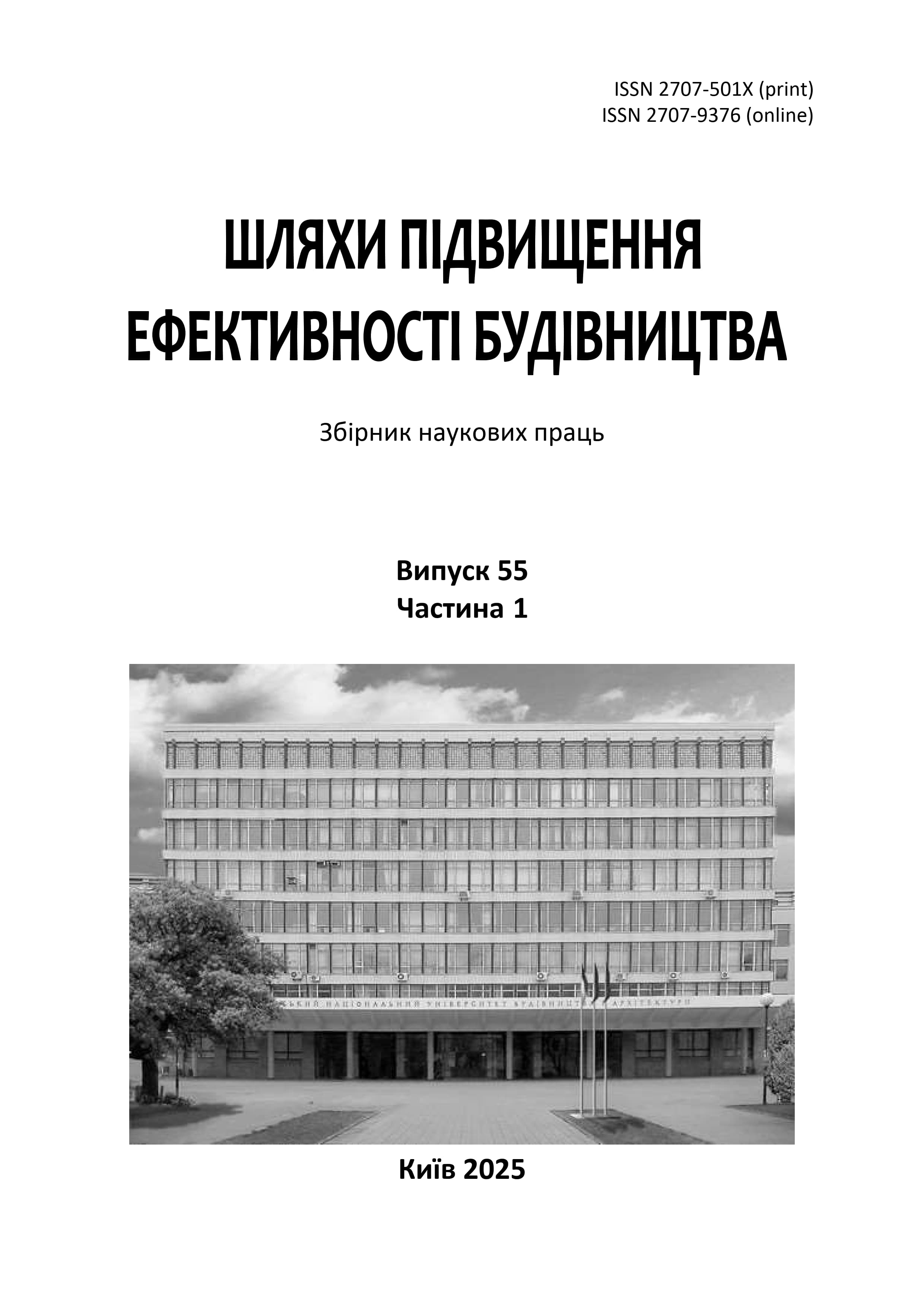Innovative principle of transformation of investment and construction entities through modern methods of reengineering
DOI:
https://doi.org/10.32347/2707-501x.2025.55(1).148-166Keywords:
reengineering, innovative technologies, construction, investment, digital transformation, strategic management, BIM, automation, process optimizationAbstract
The modern construction and investment sphere is undergoing significant changes under the influence of globalization processes, digital technologies and growing requirements for management efficiency. In this regard, the need to implement innovative approaches to the management of investment and construction entities is becoming more urgent. One of the most effective methods of modernization of management and operational processes is reengineering, which involves a radical rethinking of business processes in order to increase the efficiency, productivity and quality of construction projects.
Reengineering in the construction sector allows you to optimize costs, increase the level of automation and implement digital management tools. Modern technologies, in particular Building Information Modeling (BIM), artificial intelligence (AI), the Internet of Things (IoT) and big data, play an important role in this, which provide highly accurate risk forecasting, optimize resource planning and improve the quality of work performance control.
The use of reengineering in the construction sector contributes not only to increasing the efficiency of individual enterprises, but also to the overall improvement of interaction between all participants in the investment process. Process optimization allows you to reduce project implementation time, increase the level of communication between developers, contractors, suppliers and government agencies, which helps to increase transparency and reduce the risks of non-fulfillment of obligations.
An important aspect of an innovative approach to transformations in the construction sector is strategic change management. Reengineering allows you to integrate the concept of sustainable development, which ensures a harmonious combination of economic, social and environmental goals. The use of digital technologies contributes to the transition to "smart construction", which ensures not only the quality and efficiency of processes, but also environmental sustainability, compliance with modern regulatory requirements and international standards.
Thus, the introduction of reengineering in the construction industry opens up new opportunities for the development of the investment sector and increasing the efficiency of project management. The integration of digital technologies, optimization of business processes and strategic planning allow construction companies to adapt to modern challenges, increase competitiveness and ensure long-term sustainability in the market.
References
Anumba C.J., Egbu C., Carrillo P. Knowledge Management in Construction. Oxford: Blackwell Publishing, 2005. 386 p.
Davenport T.H. Process Innovation: Reengineering Work through Information Technology. Boston: Harvard Business School Press, 1993. 337 p.
Hammer M., Champy J. Reengineering the Corporation: A Manifesto for Business Revolution. New York: Harper Business, 1993. 272 p.
Akselrod R., Shpakov A., Ryzhakova G., Honcharenko T., Chupryna I., Shpakova Н. Integration of data flows of the construction project life cycle to create a digital enterprise based on Вuilding Іnformation Modeling. International Journal of Emerging Technology and Advanced Engineering. 2022. №12. Рр. 40-50. DOI: 10.46338/IJETAE0122_05
Koskela, L. & Howell, G.A. (2002). The underlying theory of project management is obsolete. Paper presented at PMI® Research Conference 2002: Frontiers of Project Management Research and Applications, Seattle, Washington. Newtown Square, PA: Project Management Institute.
Бондаренко Р.І. Особливості застосування реінжинірингу бізнес-процесів на сучасних підприємствах. Східноєвропейський журнал економіки та бізнесу. 2017. №11. С. 27-32. https://www.easterneurope-ebm.in.ua/journal/11_2017/27.pdf
Вахович І.В., Дем’яненко О.О., Богатюк Д.В. Реінжиніринг діяльності учасників будівництва під впливом цифровізації. Просторовий розвиток. 2023. №6. С. 338-350. URL: http://spd.knuba.edu.ua/article/view/295428
Данченко О.Б. Практичні аспекти реінжинірингу бізнес-процесів: навч. посібн. – Київ: Університет економіки та права «КРОК», 2017. 238 с. https://library.krok.edu.ua/media/library/category/navchalni-posibniki/danchenco_0001.pdf
Деркач А. Реінжиніринг бізнес-процесів будівельного підприємства в умовах цифровізації. Шляхи підвищення ефективності будівництва в умовах формування ринкових відносин. 2022. Вип. 50, ч. 2. С. 251-265. n
Михайленко А.В. Становлення системи інвестиційної діяльності в житловому будівництві. Експерт: парадигми юридичних наук і державного управління. 2018. №3. С. 112-120. https://maup.com.ua/assets/files/expert/3/10.pdf
Рижакова Г.М., Яковенко В.Б., Івахненко І.С. та ін.Основи менеджменту і маркетингу: навч. посібн. Київ: КНУБА, 2024. 176 с.
Самойленко В.В. Реінжиніринг бізнес-процесів. Вісник ХНЕУ ім. С. Кузнеця. 2020. №1. С. 123-130.
Сидоренко О.В. Інноваційний розвиток будівельного комплексу: теоретичні основи. Інноваційний розвиток. 2021. С. 5-15. https://pgasa.dp.ua/wp-content/uploads/2021/04/Innovatsijnyj-rozvytok.pdf
Рижакова Г.М, Чуприна Ю.А, Гавриков Д.О, Бородавко М.В. Формування будівельного кластеру у форматі державних інвестиційних цільових програм. Шляхи підвищення ефективності будівництва в умовах формування ринкових відносин. 2019. Вип. 40. Економічний. С. 19-25.
Downloads
Published
How to Cite
Issue
Section
License

This work is licensed under a Creative Commons Attribution 4.0 International License.
Authors who publish with this journal agree to the following terms:
- Authors retain copyright and grant the journal right of first publication with the work simultaneously licensed under a Creative Commons Attribution License that allows others to share the work with an acknowledgement of the work's authorship and initial publication in this journal.
- Authors are able to enter into separate, additional contractual arrangements for the non-exclusive distribution of the journal's published version of the work (e.g., post it to an institutional repository or publish it in a book), with an acknowledgement of its initial publication in this journal.
- Authors are permitted and encouraged to post their work online (e.g., in institutional repositories or on their website) prior to and during the submission process, as it can lead to productive exchanges, as well as earlier and greater citation of published work (See The Effect of Open Access).

